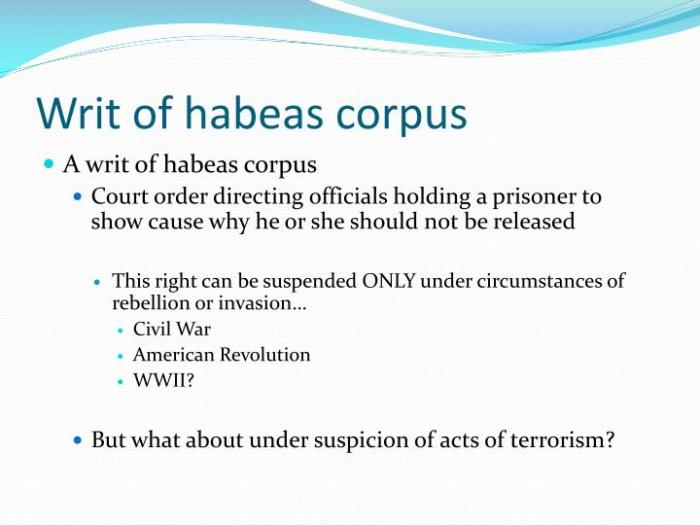The writ of habeas corpus ap gov is a fundamental legal principle that empowers individuals to challenge unlawful detention and secure their release. With roots in ancient English common law, this extraordinary remedy has played a pivotal role in safeguarding individual liberty throughout history.
Throughout the centuries, the writ of habeas corpus has been invoked to protect citizens from arbitrary arrest, prolonged detention without charge, and other abuses of power. Its enduring legacy as a cornerstone of due process ensures that no person shall be deprived of their freedom without just cause.
Writ of Habeas Corpus

The writ of habeas corpus is a legal order that requires a person under arrest to be brought before a judge or into court, to determine if the person is being lawfully detained. It is a fundamental right that protects individuals from unlawful imprisonment.
The writ of habeas corpus, a crucial legal tool in American jurisprudence, guarantees an individual’s right to be brought before a judge and have their detention examined. Similarly, in the realm of theater, “subtext” ( what is subtext in theatre ) refers to the unspoken meanings and emotions conveyed by actors, adding depth and nuance to their performances.
Just as the writ of habeas corpus ensures due process in the legal system, subtext in theater safeguards the authenticity and complexity of human expression on stage.
Historical Significance
The writ of habeas corpus has a long and storied history, dating back to the 13th century in England. It was first used to protect individuals from arbitrary arrest and detention by the king or other government officials. Over time, the writ became an important tool for protecting individual rights and liberties.
Examples of Use
- In the United States, the writ of habeas corpus has been used to protect individuals from unlawful detention during wartime, such as during the Civil War and World War II.
- It has also been used to protect individuals from being extradited to other countries where they may face torture or other human rights violations.
Limitations, Writ of habeas corpus ap gov
The writ of habeas corpus is not without its limitations. For example, it does not apply to individuals who are detained as prisoners of war or who are being held for national security reasons.
Habeas Corpus in the United States
The writ of habeas corpus has a long and storied history in the United States. It was first recognized in the common law of England, and it was brought to the American colonies by the early settlers. The writ was first incorporated into the United States Constitution in 1789, and it has been interpreted by the Supreme Court on numerous occasions.
Role of the Supreme Court
The Supreme Court has played a major role in interpreting the writ of habeas corpus. In the case of Marbury v. Madison(1803), the Court held that the writ could be used to challenge the detention of a person who was being held in violation of the Constitution.
This decision established the writ of habeas corpus as a powerful tool for protecting individual rights.
The Supreme Court has continued to interpret the writ of habeas corpus in subsequent cases. In Ex parte Milligan(1866), the Court held that the writ could not be suspended during wartime. This decision protected the rights of civilians who were being detained by the military.
In Brown v. Allen(1953), the Court held that the writ could be used to challenge the detention of a person who was being held in violation of state law. This decision extended the reach of the writ of habeas corpus to state prisoners.
Current State
The writ of habeas corpus is still an important tool for protecting individual rights in the United States. It is used to challenge the detention of persons who are being held in violation of the Constitution or state law. The writ is also used to challenge the conditions of confinement of prisoners.
The writ of habeas corpus is not without its critics. Some argue that the writ is too easily abused by prisoners who are seeking to delay their execution or who are seeking to challenge their convictions on technical grounds. Others argue that the writ is too difficult to obtain, especially for prisoners who are being held in remote locations.
Despite these criticisms, the writ of habeas corpus remains an important tool for protecting individual rights in the United States. It is a powerful tool that can be used to challenge the detention of persons who are being held in violation of the law.
Habeas Corpus and the War on Terror: Writ Of Habeas Corpus Ap Gov

The War on Terror has significantly impacted the writ of habeas corpus. In the wake of the September 11th attacks, the Bush administration expanded the use of military tribunals to try suspected terrorists, arguing that it was necessary to detain and interrogate them without affording them the full protections of the American criminal justice system.
This move was controversial, as critics argued that it violated the writ of habeas corpus, which guarantees the right to a fair and speedy trial.
Bush Administration’s Use of Military Tribunals
The Bush administration’s use of military tribunals was controversial from the outset. Critics argued that the tribunals were unfair and that they violated the Geneva Conventions, which prohibit the use of torture and other forms of cruel and unusual punishment.
In 2006, the Supreme Court ruled in Hamdan v. Rumsfeld that the military tribunals were unconstitutional because they did not provide the defendants with the basic due process rights guaranteed by the Constitution.
Obama Administration’s Use of Targeted Killings
The Obama administration has continued to use military force against suspected terrorists, but it has shifted away from the use of military tribunals in favor of targeted killings. Targeted killings are carried out by drones or other means and are often conducted without warning.
Critics argue that targeted killings violate the writ of habeas corpus because they deny the targeted individuals the right to a fair and speedy trial.
The Future of Habeas Corpus
The future of habeas corpus in the United States is uncertain. The writ has been under attack from both the executive and legislative branches of government in recent years, and it is unclear whether it will survive in its current form.
One of the biggest challenges to habeas corpus in the 21st century is the rise of terrorism. In the wake of the 9/11 attacks, the government has argued that habeas corpus is a threat to national security. This argument has been used to justify the detention of suspected terrorists without charge or trial.
Another challenge to habeas corpus is the increasing use of electronic surveillance. The government now has the ability to collect vast amounts of data about its citizens, and this data can be used to build cases against them. This makes it more difficult for people to challenge their detention, even if they have not been charged with a crime.
Despite these challenges, habeas corpus remains an important tool for protecting individual liberty. It is a way for people to challenge their detention and to ensure that they are not being held illegally.
Reforms to the Writ of Habeas Corpus
There are a number of reforms that could be made to the writ of habeas corpus to make it more effective in the 21st century. These reforms include:
- Expanding the scope of habeas corpus to cover all detainees, including those held by the military.
- Limiting the government’s ability to use secret evidence to justify detention.
- Providing detainees with access to counsel and other resources to help them challenge their detention.
- Creating a special court to handle habeas corpus cases involving terrorism.
These reforms would help to ensure that habeas corpus remains a vital tool for protecting individual liberty in the 21st century.
User Queries
What is the purpose of a writ of habeas corpus?
A writ of habeas corpus is a legal order that commands a person or entity to produce a prisoner before a court to determine if their detention is lawful.
How has the writ of habeas corpus been used to protect individual rights?
The writ of habeas corpus has been used to challenge unlawful detention, secure the release of individuals held without charge, and prevent arbitrary imprisonment.
What are the limitations of the writ of habeas corpus?
The writ of habeas corpus may be suspended during times of war or national emergency, and it does not apply to individuals detained as enemy combatants.